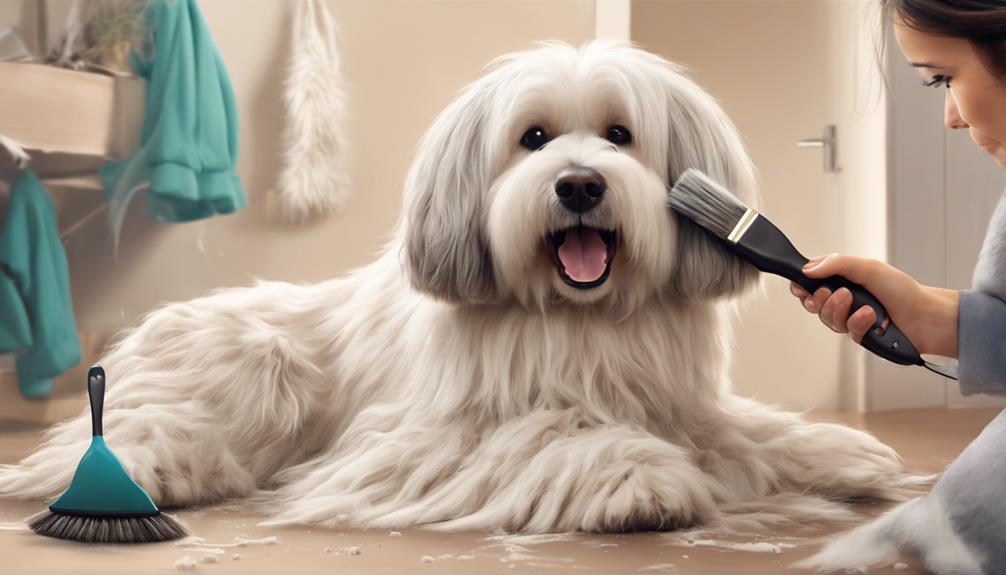What Are Effective Tips to Manage Dog Shedding?
If you've ever found yourself buried in a sea of dog fur, you're not alone. Managing your furry friend's shedding can be a challenge, but fear not, there are effective strategies to help you keep your home fur-free and your pup looking their best.
From simple grooming practices to dietary adjustments, there's a range of tips to explore. So, if you're tired of constantly battling with dog hair, stay tuned for some practical advice that could make a noticeable difference in your canine companion's shedding habits.
Regular Grooming Practices
To effectively manage your dog's shedding, make sure to establish a routine for grooming. Shedding prevention and control can be significantly improved through consistent fur maintenance. Regular grooming is key to minimizing the amount of loose fur your dog sheds around your home. Brushing your dog's coat regularly with the appropriate grooming techniques can help remove loose fur before it ends up on your furniture and clothes.
Invest in a good quality brush that suits your dog's coat type. Different breeds require different grooming tools, so make sure to choose one that's suitable for your dog. For dogs with longer fur, consider using a slicker brush to detangle and remove loose hair. Shorter-haired breeds may benefit from a grooming mitt or rubber curry brush to help with shedding control.
Make grooming sessions a positive experience for your dog by using treats and praise. This will help them associate grooming with something enjoyable, making it easier for you to maintain a regular grooming routine. By incorporating these grooming practices into your dog's care regimen, you can effectively manage their shedding and keep your home cleaner.
Proper Diet and Nutrition
Ensuring your dog receives proper nutrition through a balanced diet is essential in managing shedding effectively. A diet rich in essential nutrients like Omega-3 fatty acids, vitamins, and minerals can help maintain your dog's skin and coat health, reducing excessive shedding.
Consider incorporating high-quality dog food that's specifically formulated to support skin and coat health. Additionally, you can explore dietary changes such as adding foods like salmon, flaxseed, or eggs to your dog's meals, as these are rich in Omega-3 fatty acids which can help reduce shedding.
Nutritional supplements like fish oil or specialized skin and coat supplements can also support your dog's overall health and reduce shedding. Remember to consult your veterinarian before making any significant changes to your dog's diet to ensure it meets their specific nutritional needs.
Manage Stress and Anxiety
Consider how your dog's environment and daily routine may be contributing to their stress and anxiety levels, as managing these factors can have a significant impact on reducing shedding. Stress reduction plays a crucial role in managing your dog's shedding.
Dogs, like humans, can experience stress due to various factors such as loud noises, changes in their environment, or being left alone for long periods. To help reduce stress, ensure your dog has a safe and comfortable space, provide regular exercise, and establish a consistent routine.
Anxiety management is another key aspect to consider. Dogs can exhibit anxiety through behaviors like excessive licking, panting, or restlessness, which can contribute to increased shedding. To manage anxiety, consider activities like interactive play, training exercises, or calming techniques such as massage or aromatherapy.
Consider Supplements
Wondering how supplements can help manage your dog's shedding? Adding supplements to your furry friend's diet can provide various benefits that contribute to reducing excessive shedding. Here are some key points to consider:
- Supplement Benefits: Certain supplements like Omega-3 fatty acids can improve your dog's skin and coat health, leading to reduced shedding.
- Dosage: It's crucial to follow the recommended dosage provided by your veterinarian or the supplement packaging to ensure effectiveness without any adverse effects.
- Shedding Reduction Strategies: Supplements work best when combined with other shedding reduction strategies such as regular grooming and a balanced diet.
- Consult Your Vet: Before introducing any supplements, consult with your vet to determine the best options for your dog's specific shedding issues.
- Consistency is Key: To see noticeable results, consistency in providing the supplements is essential. Incorporate them into your dog's routine for optimal benefits.
Keep Your Dog Hydrated
To help manage your dog's shedding effectively, make sure to keep them well hydrated at all times. Water intake plays a crucial role in maintaining your dog's overall health, including their skin and coat condition. Adequate hydration supports healthy skin, reducing the likelihood of excessive shedding. When your dog doesn't drink enough water, their skin can become dry and flaky, leading to increased shedding. By encouraging proper water intake, you can aid in shedding prevention.
Ensuring that your dog has access to fresh, clean water throughout the day is essential. Proper hydration not only benefits their skin and coat but also supports their overall well-being. You can also incorporate water-rich foods into their diet, such as wet dog food or adding water to their dry kibble. Additionally, be mindful of your dog's water bowl placement and refill it regularly to encourage sufficient water intake. By prioritizing your dog's hydration, you can help manage shedding and promote a healthier coat.
Maintain a Clean Living Environment
Maintaining a clean living environment for your dog is essential in minimizing shedding and promoting their overall well-being. To help with shedding control and ensure a healthy space for your furry friend, consider the following cleaning tips:
- Regular Vacuuming: Vacuuming your home frequently helps to remove loose fur from floors and furniture.
- Wash Bedding: Wash your dog's bedding regularly to eliminate excess fur and dirt that can contribute to shedding.
- Use Pet-Friendly Cleaners: Opt for pet-friendly cleaning products to avoid harsh chemicals that may irritate your dog's skin and worsen shedding.
- Grooming Tools Cleaning: Regularly clean your dog's grooming tools to prevent the buildup of hair and dirt, which can lead to increased shedding.
- Air Purification: Invest in an air purifier to help capture pet dander and airborne fur, reducing shedding and keeping the air clean for both you and your dog.
Brush Your Dog Regularly

Regular brushing of your dog's coat is essential for managing shedding and keeping their fur healthy. This practice becomes even more crucial during shedding season or if you have a dog breed that's prone to heavy shedding. By using the right shedding tools and establishing a consistent brushing frequency, you can effectively reduce the amount of loose fur in your home.
For shedding breeds like Siberian Huskies or German Shepherds, a deshedding tool or slicker brush can be highly beneficial in removing loose fur and preventing mats from forming. It's recommended to brush your dog at least a few times a week, if not daily, to stay on top of shedding and maintain a healthy coat.
Regular brushing not only helps to manage shedding but also promotes good circulation and distributes natural oils, keeping your dog's skin and coat in top condition. Make brushing a positive experience for your furry friend by using gentle strokes and offering treats for a job well done.
Consult a Veterinarian if Needed
If necessary, seek advice from a veterinarian to address any concerns regarding your dog's shedding. Veterinarians can provide valuable insights and guidance on how to manage shedding in your furry companion effectively.
When consulting a veterinarian about your dog's shedding, consider the following:
- Shedding Frequency: Discuss with the veterinarian how often your dog sheds to determine if the frequency is within a normal range.
- Shedding Severity: Describe the extent of your dog's shedding to assess if it's excessive and may indicate an underlying health issue.
- Nutritional Advice: Veterinarians can recommend specific diets or supplements that may help improve your dog's coat health and reduce shedding.
- Allergy Testing: If you suspect your dog's shedding is due to allergies, a veterinarian can conduct tests to identify potential allergens.
- Medication Options: In severe cases of shedding, veterinarians can suggest medications or treatments to alleviate excessive shedding and promote a healthier coat.
Consulting a veterinarian is crucial in addressing any shedding concerns and ensuring your dog's well-being.
Frequently Asked Questions
Can Certain Breeds of Dogs Shed More Than Others?
Certain breeds of dogs can shed more than others due to their genetic makeup. Grooming techniques play a significant role in managing shedding patterns. Understanding breed-specific shedding tendencies can help you stay ahead of excessive hair fall.
Regular brushing and grooming can help control shedding and keep your furry friend's coat healthy and shiny. By being proactive in your grooming routine, you can minimize the impact of shedding on your home and clothing.
Are There Specific Times of the Year When Dogs Shed More Heavily?
During certain times of the year, dogs shed more heavily due to seasonal factors. Shedding patterns can vary depending on the breed and individual dog.
To manage this shedding frequency, try using grooming techniques like brushing regularly to help remove loose fur. This can also help reduce the amount of hair that ends up around your home.
Keep up with grooming routines to keep shedding under control.
Is There a Correlation Between a Dog's Overall Health and the Amount They Shed?
When it comes to your dog's shedding, their overall health plays a crucial role. Proper nutrition impacts the condition of their coat, affecting shedding.
A stress connection can also lead to increased shedding. Ensuring your furry friend is healthy and happy can help minimize excessive shedding.
Regular vet check-ups, a balanced diet, and a stress-free environment can all contribute to managing your dog's shedding effectively.
Are There Any Natural Remedies or Homemade Treatments That Can Help Reduce Shedding?
To reduce shedding, try various grooming techniques like regular brushing and bathing. Consider adding dietary supplements to their meals.
Essential oils can also be beneficial. Home remedies like oatmeal baths or apple cider vinegar rinses may help.
How Can I Tell if My Dog's Shedding Is Excessive and Requires Medical Attention?
To determine if your dog's shedding needs medical attention, observe shedding patterns. Excessive shedding might indicate an underlying health issue. If you notice bald patches, skin irritation, or a significant increase in shedding, consult a vet.
Regular grooming techniques like brushing can help manage shedding, but if you suspect a problem, seeking professional advice is best. Keep an eye on changes in your dog's shedding habits to ensure their health and well-being.
Conclusion
Overall, managing your dog's shedding doesn't have to be a daunting task. By implementing regular grooming practices, providing a proper diet, managing stress, considering supplements, and keeping your dog hydrated, you can significantly reduce shedding.
Maintaining a clean living environment and brushing them regularly are also essential steps in managing shedding. Remember, if you ever have concerns about your dog's shedding, it's always best to consult with a veterinarian for personalized advice and guidance. Your furry friend will thank you for it!
